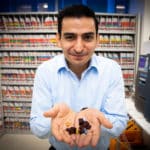An electronic astronaut is helping researchers spot the difference between normal four-year-old energy and the signs of attention difficulties.
TALI (Training Attention and Learning Initiative) Detect is a series of short games for tablet computers. It’s been made possible by combining 20 years of neuroscientific research at Monash Institute of Cognitive and Clinical Neurosciences (MICCN) with the expertise of Australian game developer Torus Games.
Continue reading A different kind of tablet to test for early childhood attention difficulties









